#humanists
Explore tagged Tumblr posts
Text

The relentless campaign to erase William Shakespeare, by any means necessary, is very sick. Besides Oxford, the Smithsonian has been involved and now it appears that the BLM/Boule set and they're African connections are also in on it. Whether this is mere sabotage or even just action to kill something else that people enjoy, there's some very evil people behind this. Typical African is connected to the WOODZ blog, which although claiming to be FBA, constantly hosts anti-Black bloggers in its space and does promo for Beyonce. I just caught someone connected to Chuck D, calling people the N word. I'll also just guess the same people who tried to start the Puerto Ricans vs Black Americans beef, are also behind this shite.
#Literary Sabotage of William Shakespeare Conducted By#Oxford University#The Smithsonian#Humanists#Satanists#BLM#Boule#African BLM Terror Group#Typical African#Woodz#Beyonce#Chuck D#FBA#Jews eill do anything to start fuggts between people
1 note
·
View note
Text
Humanism is "All Lives Matter" for Democrats.
0 notes
Text
Um...
Yeah...
All this human tribalism needs to cease and desist.
Where is Miss Priss? Um, Tara Lombardio or Lambardia or whatever. Hooker from NYC who moonlights as a laywer and a psychologist while making a perfectly happy life for herself as a Jewish Lesbian Prostitute roaming the streets of Lower Manhattan.
Bitch is divinity.
Bitch deserves both her kudos, as well as worship.
Bitch has a dad, who needs to learn to keep her on a shorter leash.


#England#People#United Kingdom#Northern Europe#Life#Politics#Tribalism#Society#New York#BBC#Dawn French#Mohawk Terrorism#Mohawk Moments#Mohawk#Humanists#Human Tribalism#Lombardio#Lombardia#NYC#Gina
0 notes
Text
Fairies in the garden?
The Humanists UK have been circulating this meme again recently. It occasionally does the rounds. On the surface, it seems quite witty and clever. That’s no surprise, Douglas Adams was a clever, witty author. However, not all that sounds clever is wise and well-reasoned. This is one such case. We can of course forgive Adams, a writer of comedy fiction that. However, you would hope that…
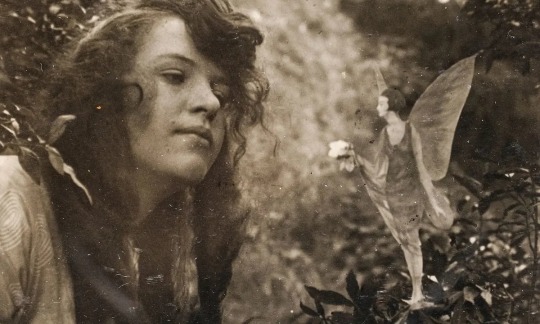
View On WordPress
0 notes
Text
Controversial, but what a lot of ppl don't get is that I'd rather accidentally believe a liar/false accuser than a rapist, 100% percent of the time. I'd rather live in a world where victims are believed first and foremost than a world where even a single victim has to suffer. I'd rather live in a world where the less vulnerable population suffers because they are assumed guilty, every single time.
I'd rather live in a culture where every action or relationship with a power dynamic is scrutinized to hell and back and considered immoral, than even a single vulnerable person suffer because 'choice' or whatever. This will come at the cost of the few supposedly healthy relationships and a miniscule amount of genuinely innocent people, but I think it's worth it. For the collective good of vulnerable people. You either get it or you don't
#mine#radblr#radical feminist community#radical feminist#radical feminist safe#radical feminism#radical feminists do interact#Considered immoral from a radical feminist humanist perspective not a religious conservative one
723 notes
·
View notes
Text
Noah Wyle talking about his experience with Doctors of the World in Macedonia during the Kosovo War. His trip there inspired John Carter’s storyline in the Congo and Darfur on ER.
Watch this whole interview with the Thread. It’s wonderful.
284 notes
·
View notes
Text
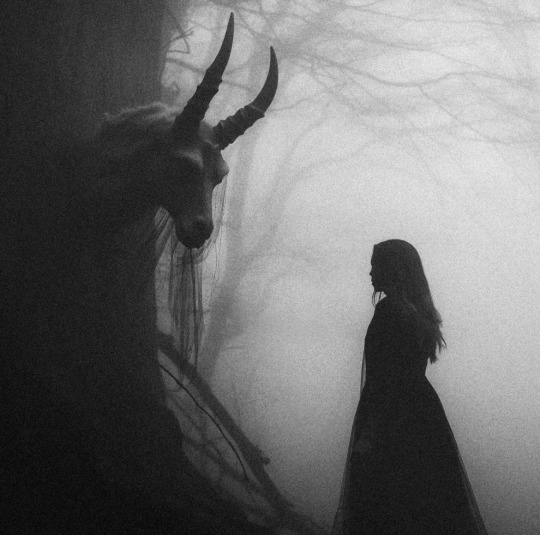
"A stranger is just a friend you haven't met yet..." (Steven Moffat in "Doctor Who")
#goth#gothic#goth aesthetic#alternative#grunge#aesthetic#horror#alt girl#dark grunge#goth girl#Steven Moffat#12th doctor#doctor who#peter capaldi#humanistic psychology
260 notes
·
View notes
Text
If you're a self-described humanist, your opinion is worth 1/3 of a normal person's opinion.
It's like an unspoken rule.
0 notes
Note
Bro no one hates jews for ethnicity, news are hated for faith.
If you are an atheist "jew", no one gives a shit about you.
Stop pretending to be a victim and trying to appropriate antisemitic struggles.
I'll address these point by point.
Jewish readers, please share your thoughts!
You wrote: "No one hates Jews for ethnicity, [J]ews are hated for faith."
"Hitler...defined the Jews as a race and not a religious community, characterized the effect of a Jewish presence as a “race-tuberculosis of the peoples,” and identified the initial goal of a German government to be discriminatory legislation against Jews."
[Source]
More here
As David Baddiel put it, "I'm an atheist, but that would get me no free passes out of Auschwitz."
The Jews are a people. Judaism is the traditional religion of that people. A Jew who does not engage with that religion does not cease to be a Jew by Jewish definitions OR by antisemitic definitions.
You wrote: "If you are an atheist Jew, nobody gives a shit about you."
First, see above.
Second, you're incorrectly assuming that a Jewish atheist is not engaged with Judaism.
Here's the thing:
Judaism isn't necessarily theistic.
Let's set aside the explicitly non-theistic movement of Humanistic Judaism for a moment (huge topic for another time) and just talk briefly about theism in Judaism.
Most kinds of Judaism, while certainly encouraging faith, do not require it. There are no thought crimes in Judaism, no crucibles of faith, and no requirements that one announce or perform proof of belief for witnesses. Those things are often parts of Christianity and Islam, but in Judaism...not so much.
In Jewish thought, it is not what you believe about metaphysics which lifts you up, ennobles you, improves you, or makes the world a better place. In Judaism, you pursue those things by how you behave.
Sola fide is a Christian concept which Judaism does not share. Judaism is a profoundly existential religion with ethics which are overwhelmingly humanist.
I was raised in Reform and Conservative congregations...and non-theistic/atheistic/humanistic views were very common there.
When I was studying to become Bar Mitzvah, our congregation's Rabbi made crystal clear to me that there was no contradiction between my identity as a Jew and my inability to swallow the idea of an anthropomorphic, sapient, interventionist God who cared at all about petitionary prayer. He felt that wrestling with God was a very Jewish thing to do. He introduced me to Maimonides' apophatic theology. Decades later, I'm still grateful.
Many Jews pray, I believe, not to be heard by God, but so they can hear their own hearts and minds. This is why kavanah is important and why I disliked (and still dislike) prayer-by-rote and rituals performed for the sake of ritual. It's more mindfulness meditation than petitionary prayer.
There's a famous Hasidic story, recorded by philosopher Martin Buber in his "Tales of the Hasidim," about how Judaism views atheism:
The Master teaches that God created everything the world to be appreciated, since everything is here to teach us a lesson.
One clever student asks "What lesson can we learn from atheists? Why did God create them?"
The Master responds "God created atheists teach us the most important lesson of them all- the lesson of true compassion. You see, when an atheist performs an act of charity, visits someone who is sick, helps someone in need, and cares for the world, he is not doing so because of some religious teaching. He does not believe that God commanded him to perform this act. In fact, he does not believe in Goda at all, so his acts are based on an inner sense of morality. And look at the kindness he can bestow upon others simply because he feels it to be right."
"This means," the Master continued "that when someone reaches out to you for help, you should never say 'I pray that God will help you.' Instead for the moment, you should become an atheist, imagine that there is no God who can help, and say 'I will help you."
You wrote: "Stop pretending to be a victim and trying to appropriate antisemtic struggles."
I invite other Jews to advise if I have appropriated anything which is not mine.
Your opinion, though? Your view, as a non-Jew, about what is or isn't Jewish? On what is or is not mine in my heritage? Your claim, framed by your obvious and absolute ignorance of my life, my family's history, Jewish history, Jewish theology, and Jewish philosophy, that I have not experienced antisemitism and am "appropriating?"
I don't have a single fuck to give about any of that, and neither does any other Jew
Still, thank you for the writing prompt. It helps to crystalize my own thinking and provides an opportunity to educate.
#jumblr#hate mail#Racial antisemitism#antisemitism#Atheism#Humanistic Judaism#Maimonides#Apophatic theology#Jewblr#jewish tumblr
441 notes
·
View notes
Text
“Oh I’m just not the creative ty-“
Wrong, all humans are inherently creative in some way when their needs are met and they are given the leisure time to pursue hobbies. It came free with your being a social species wired by evolution to love doing stuff with your hands. Don’t define art through a consumerist lens where it’s only worth existing if it’s something someone would buy. Connect with your inner monkey, create to create and let it just be.
#secular humanism#humanist#deconstruction#ex christian#ex evangelical#agnosticatheist#atheist#human biology#human evolution#human behaviour#human beings#leftist#art history#artwork
842 notes
·
View notes
Text

#Ongoing Hate Campaign On Social Media Targeting Black Americans#AIPAC#BLM#Pan Africanist Front Group For The Prince Hall Freemasons#Israel#Qatar#Ireland#Canada#Scientology#Scottish Rite Freemasonry#Humanists
0 notes
Text
Stede Bonnet, Renaissance Man (Or an Exceptional Man who Thinks He’s Mediocre)
I’ve posted before about Stede’s love of beauty. He’s an aesthete, finding wonder in art and creative self-care rather than the transcendental. Stede’s a freethinker. He challenges the orthodoxies of his time, rejecting forced heteronormative behaviours, and even questioning the accepted traditions of piracy.
The thing about Stede is he often asks ‘why?’ It’s partly what makes him dangerous to some. This slant towards subversion is much of what Izzy observes and detests. It’s one of many reasons Stede must be kept from Ed. Like a number of Renaissance-style thinkers before him, Stede refuses to go along with the status quo. He is ‘doing something original’, questioning dogma. Many find it ridiculous, bizarre even. And it’s significant that instead Ed finds Stede enchanting, because it demonstrates who Ed might be given the chance to find his own path.
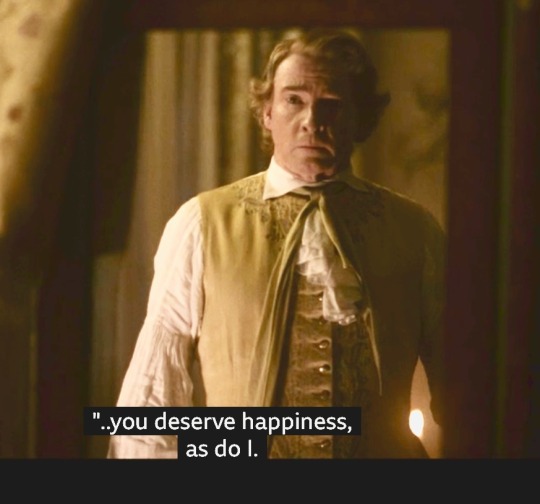
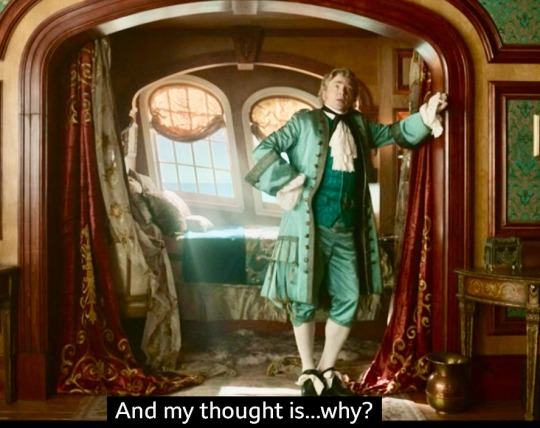
Stede is also a polymath and likely an autodidact - I doubt he learned about ‘insane foliage’ at school. He is self-motived and seems to have knowledge across a broad spectrum of disciplines. Literature, drama, botany, entomology, psychology, art, textiles. Stede’s very much about the life of the mind.
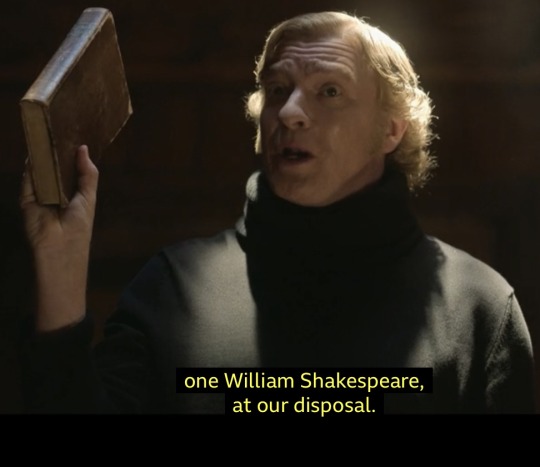

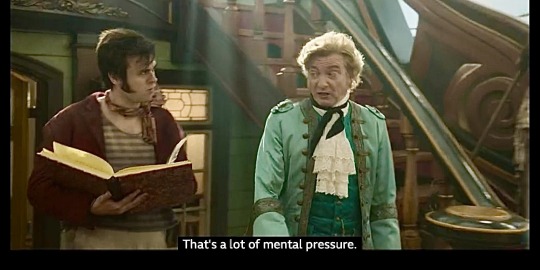
And he’ll approach areas at which he’s not so gifted, such as cartography and sword-fighting, with the enthusiasm of a dilettante; when he can’t succeed the traditional way, he simply subverts the discipline and does it his own. However, the most important thing for me in defining Stede as a Renaissance man is his humanism. People are front and centre. Sometimes that person is himself, and he loses sight of others. But it’s okay as that’s the point. Humanism is partly about being a messy individual who can do better. And Stede is someone who can learn and alter his position when circumstances change. He might not do so in the best way all of the time, but he is a quick-learner and highly-adaptable.
Stede also understands that no culture or institution is bigger than the people within it. The most important thing is human dignity - it’s what he shows and teaches Ned’s crew: that they deserve to be respected as people. Stede also has a strong moral core. When he messes up, he feels it deeply. He demonstrates strong ethics towards the natural world too - he’s absolutely disgusted by turtle vs. crab. Stede believes not so much in human superiority, but human responsibility, and this is the flip side of having dignity as a human being.
Another aspect of Stede’s humanism is his belief that culture should be accessible to all. Some of this might be naivety on Stede’s part rather than a well-thought out philosophy, but he believes in it intuitively. Stede wants the crew to have access to his library despite not recognising they can’t all read. He gives them musical instruments and sports facilities - he’s interested in what makes people flourish. And Stede practically invents art therapy!

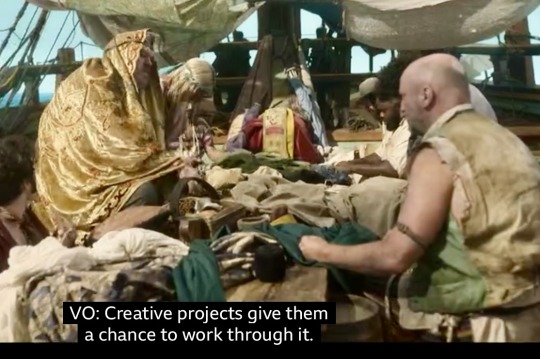
His ship is also a safe-space for human relationships to blossom - romantic, platonic, and in between. Zheng’s ship might appear to offer collective harmony, but it’s mandated and dogmatically applied. Opting out of morning tai chi for a 24-hour shagathon might be viewed as an act of dissent. No such big brother is judging you on Stede’s Revenge.
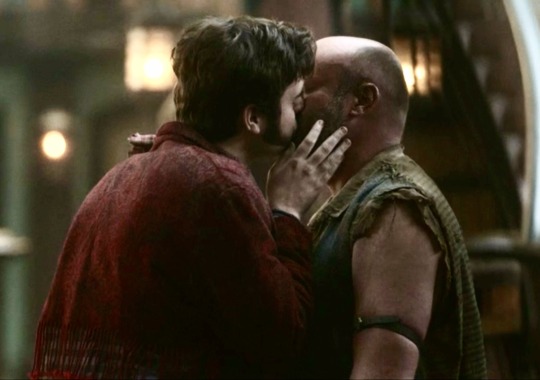
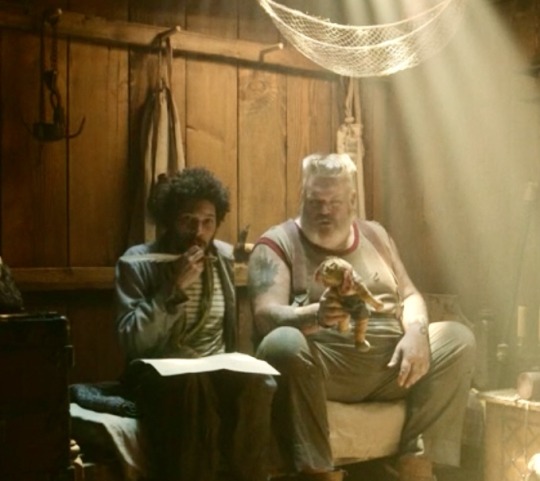
And all of this is because of the man Stede is, and the influence he has on those around him. Sometimes it falls on deaf ears. Many don’t like what Stede’s offering. Others actively rebel against it. But anyone with an ounce of goodness will get what Stede Bonnet is about and embrace it. Stede doesn’t seem to understand his own power, it comes from such an authentic place. For me, it makes him all the more endearing.
241 notes
·
View notes
Text
Terminology as a cultic marketing tactic
Oftentimes, cults and cultic movements will use flowery names for themselves in order to silence criticism. For example, the concept of neurodiversity, the existence of more than one distinct neurotypes among humans, is real. But a particular movement that promotes pseudoscience has taken the name "neurodiversity" for themselves. In this way, they can insist that any criticism of the movement is a denial of the concept. It is an offensive tactic, as a casual observer would likely not take the time to do the research and realize that the movement and concept are two entirely different things.
Other examples include:
Humanism: Since it has "human" in the name, humanists will paint their critics as misanthropic.
Men's rights: Since the movement has "men" and "rights" in the name, MRAs will paint their critics as haters of men (including male critics), or haters of rights. The same applies to men's liberation.
Transgenderism/trans rights: Since the movement has "transgender" in the name, transgenderists and TRAs will paint their critics as "hateful" towards trans people.
All Lives Matter: Since the movement has "all lives" in the name, its adherents will paint their critics as being misanthropic or apathetic towards people's lives, for much the same reason as humanists.
#cult#cults#marketing#marketing tactics#neurodiversity#neurodiversity movement#neurodiverse#humanism#humanists#secular humanists#men's rights#men's rights activist#men's rights activists#men's rights movement#men's rights activism#mra#mrm#mras#mens rights#transgenderism#transgenderists#tra#all lives matter
1 note
·
View note
Text
Was explaining my thoughts about Vaugardian attitudes towards mental health and therapy as part of a different topic, but it got really long so dfjkghdf here it is as a whole post! Starting with some more general worldbuilsing but hold on, we’ll get there.
Since Houses canonically contain libraries and infirmaries and provide things like education and transition care, I see them as a center of not just community but specifically community resources. If you have a problem or a question, you go to the local House, and if they can't solve it themself they'll point you in the direction of whoever can! Thus Housemaidens generally fill a role similar to social workers, and specific Housemaidens will have specialties like being a doctor, cook, teacher of a particular subject, etc. In larger cities, a lot of the more specific or labor-intensive resources would probably be outsourced to other charities/companies/organizations, or perhaps split into specialties by House, to better serve a dense population instead of trying to cram every resource into every neighborhood's House. But you would still go to any House first to find these other resources, so every House would maintain a focus on educating and advising. Combine this with the fact that religious leaders are often one of the first people that followers go to for personal guidance, and it makes sense that Housemaidens would provide all sorts of counseling, filling the role of everything from job coach to therapist.
If Housemaidens are the people providing all or at least most of the therapy in the country, then even if they're not trying to push religious doctrine, the Change belief is still going to be the source of the values and philosophies that their therapeutic models are based in. They can try to be nonpartisan and avoid mentioning Change in so many words, but it'll still be baked into the default assumptions of the local modalities in a self-perpetuating manner. If you want an entirely different approach, you're probably going to have find someone who specifically studied alternate modalities from other countries, any of which would have a much smaller market share than Change-based therapies.
So! Vaugardian therapy will focus on questions like "What Changes have been happening in your life lately, and how do you feel about them?" "What would you like to Change in your life?" "What can you Change about your thought processes and habits to address the things that trouble you?" and "Who do you want to be?" Which sound like just a particular way to word fairly common topics, but! These questions would be asked in pursuit of Change-y goals, as well.
The goal of irl mental healthcare as an industry is to make sure people can be productive. A common diagnostic question is "does this symptom interfere with your ability to work and otherwise get things done?" But Vaugardians are friendly and helpful to the point of approaching utopia, so I could see them being less concerned with this, because they're more willing to accept that some people can't work and some people need more support. In fact, in keeping with their distaste for carcinization, they might actively oppose the idea that there is any particular goal that people should be working towards. If there's one type of existence that is best for all people at all times, reaching it would mean there's no reason to ever Change again! So instead of any particular milestones, the goal is simply to set and strive towards goals that feel right to you.
I also think they'd be less likely to work off of a diagnostic model at all; you can't just say that someone inherently has depression. They may be depressed right now, but that can Change! The Change might require constant upkeep, but some Changes are like that, and it doesn't mean the Change is any less real. Instead, they'd probably be more focused on individual symptoms (and traits!), which might tend to come in certain clusters, but those clusters would be seen as trends rather than criteria. The Change modality would be less concerned with whether a state of being is disordered vs normal/healthy (and they'd be less likely to conflate "normal" and "healthy"), focusing instead on whether you're happy with where you're at, but also willing and able to Change as suits you.
So, "I feel apathetic all the time, I don't want to put effort into anything and I don't care about anything, I don't know who I am or who I want to be" would be an experience of depression symptoms that a Vaugardian therapist would prioritize helping you Change. But "I don't care about any of the things I used to care about, I think I want to quit my job and cut off all my friends so I can spend more time sleeping" would be... an idea a good therapist may recommend you spend some time exploring, to make sure that's what you really want and you're ready for the ramifications... but they wouldn't say, "No, that's a bad thing to want, we need to treat your depression so that you no longer want to do that." If you really do hate your job and your friends right now, stagnating in that because you feel like you ought to would be the worst case scenario! If pursuing this Change ends up making you feel unfulfilled and lonely and sick of sleeping all day, then, well, you can just Change again at that point, once you've decided that's what you want to do.
In an opposite example, a common criticism of irl therapy is that it provides bandaid solutions for structural issues. "I'm anxious about losing my job" might be addressed by mindfulness methods to lessen anxiety, which is better than nothing, but if you're genuinely in danger of losing your job and thus access to shelter and food, that's not something you can mindfulness away. Versus, in Change-based therapies, they would focus on discussing what you get out of that job and what about it makes you anxious. You might decide that you want to change careers to something that fits you better right now — which would be a lot easier to accomplish in Vaugarde than it would be irl, because of the resources provided by the Houses and general community. Or, you might decide that there's something about yourself that you want to change in order to better fit the job. So instead of working on the feeling of anxiety, you might work on building new skills, or building better relationships with your coworkers.
... I wrote this post thinking that Vaugardian therapy might use similar techniques to CBT (therapy), since CBT focuses on understanding the patterns of thought, behavior, and belief that lead to psychological issues, so that you can replace negative patterns with habits that serve you better. Sounds like making mental changes in order to change your feelings and actions! It would just be in favor of different goals than irl CBT under capitalism.
However. I did some more research, and it looks like Humanistic therapy is very similar to what I made up just now? According to this text, humanistic therapy "emphasizes growth and self-actualization rather than curing diseases or alleviating disorders." Psychological issues are "viewed as the result of inhibited ability to make authentic, meaningful, and self-directed choices about how to live," so it focuses on "helping people free themselves from disabling assumptions and attitudes so they can live fuller lives."
It's less of a set of techniques and more of a philosophy. According to this website, the key is empathy and "unconditional positive regard," which means the therapist "shows warmth, is receptive, and is nonjudgmental." They cultivate a casual, friendly atmosphere, instead of positioning themself as an authority figure. Client-centered therapy is a subtype that sounds like the most cliché sort of talk therapy; the therapist "listens, acknowledges, and paraphrases your concerns," giving you a space where you can be honest and accepted as yourself. Another subtype is gestalt therapy, which "focuses on the skills and techniques that allow you to be aware of your feelings and emotions," and encourages a focus on the present and self-responsibility.
So! That sounds about right! Vaugardian therapists aim to help you recognize your emotions and figure out who you are and who you want to be, through casual conversation and empathetic active listening, without judgement. They help you look at your skills, emotions, desires, and struggles, and guide you to consider the full breadth of options available to you, so you can decide what Changes will lead you to happiness and fulfillment. They especially try to avoid diagnosing, prescribing, or otherwise telling you who you must be or what you must need. They may provide suggestions — help you put something into words, or bring up options that professionals are more familiar with such as medication, or challenge you to re-examine your assumptions — but it's a collaborative brainstorming, and they want you to freely choose the option you think is best for you.
#also. while i'm here. the island north of vaugarde is into mindfulness and DBT#and maybe the parts of existential therapy that are less similar to other kinds of humanistic therapy.#and ka bue's most popular modality is similar to internal family systems therapy#(which is about recognizing and helping the different parts of you that feel and want different things)#but they call it something about facets. heehee#in stars and time#isat#vaugarde#s.worldbuilding#s.isat#s.vaugarde#help i spent over 6 hours on this post#working my 9 to 5 in the fandom analysis mines
87 notes
·
View notes
Text
When the vampire isn’t even a little bit of a bastard it’s like well what was the point in all that
#forget my last post this movie wasn’t good#boring ass man#*humanist vampire is the one exception because her family is a bunch of bastards#somebody has got to be at least a little flippant about human life
97 notes
·
View notes